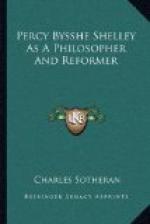The favorite theme in the writings of Shelley is “Eros,” love of the individual, of the race, of nature, and in this he follows Christ, in whose system of Philosophy, Love is ever the pre-dominating idea which permeates mankind with its beneficial effects, and will, when the bastard tinsel with which the truths of the Nazarene are hidden, be replaced by that pure gold which it is impossible to trace in the enunciations of any previous philosopher. This subject is always present to Shelley, and he thus appeals in one of his poems to the
“Great Spirit, deepest
Love!
Which rulest and dost
move
All things which live,
and are.”
In another place he inquires—
“What is love?
Ask him who lives, what is life? Ask him who
adores, what is God?”
And in the same essay he describes love as
“The bond and
sanction which connects man with man, and with
everything which exists.”
Elsewhere he points out that the attainment of love
“urges forth the power of man to arrest the faintest shadow of that without the possession of which there is no rest nor respite to the heart over which it rules, (and that) so soon as this want or power is dead, man becomes the living sepulchre of himself, and what yet survives is the mere husk of what once he was.”
Of such was Shelley’s philosophy of love, and I would ask if it be conceivable that the abominable calumny prompted by theological virus, that he kept a seraglio, as his friend Leigh Hunt informs us was reported, had any real existence. Shelley was too pure for any such idea as that of promiscuous sexual intercourse to be acted on by himself; his life, which lies open before us, refutes the diabolical invention. The fact was, that at the early age of nineteen he married Harriet Westbrook, the daughter of a retired tavern keeper, a woman without soul and that congeniality of disposition which a man overflowing with the pulses of genius should have chosen. After a wretched existence without intellectual sympathy, and on the advice of her father, who did not agree with his ideas on religion, they parted by mutual consent, never to meet again. Shelley about this period met his second wife, a woman of the highest powers of mind and charm of body, Mary Wolstonecraft Godwin, the authoress of Frankenstein and other works, daughter of William Godwin, the novelist, and author of Political Justice and Mary Wolstonecraft, the gifted writer of The Rights of Women. We are told by Lady Shelley that, “To her, as they met one eventful day in St. Pancras churchyard, by her mother’s grave, Bysshe, in burning words, poured forth the tale of his wild past, how he had suffered, how he had been misled, and how, if supported by her love, he hoped, in future years, to enroll his name with the wise and good, who had done battle for their fellow-men and been true through all adverse storms to the cause of humanity. Unhesitatingly she placed her hand in his, and linked her fortune with his own.”




